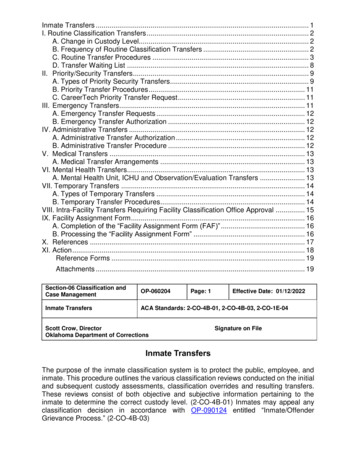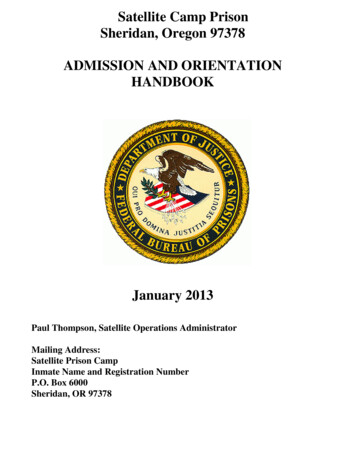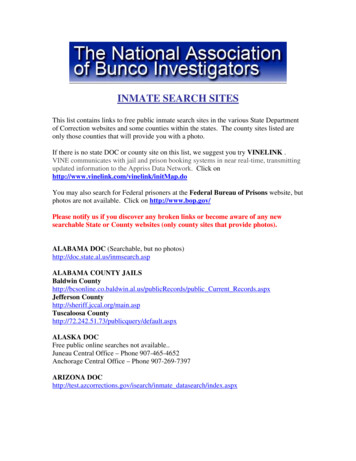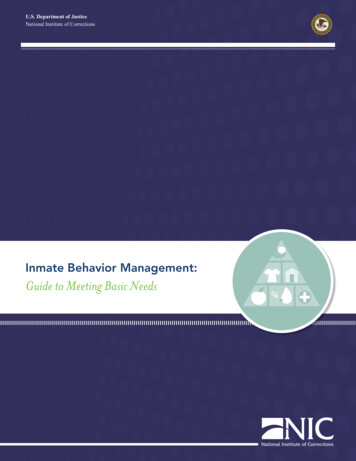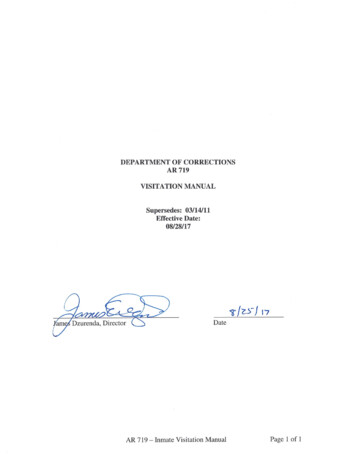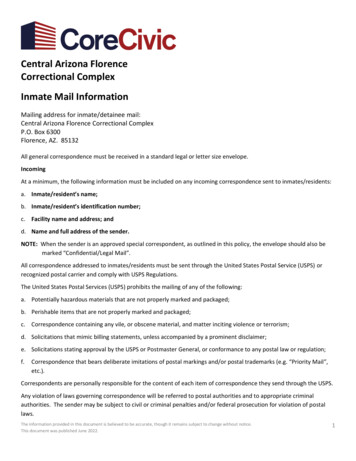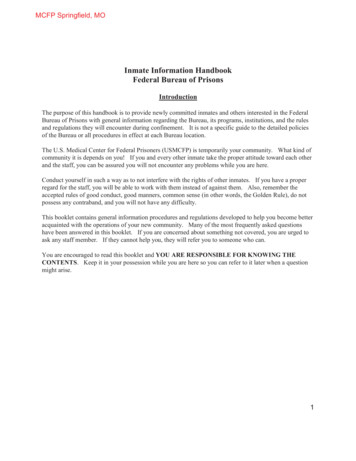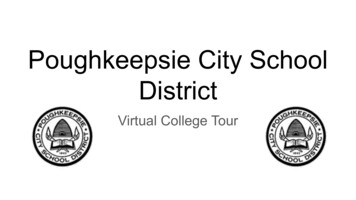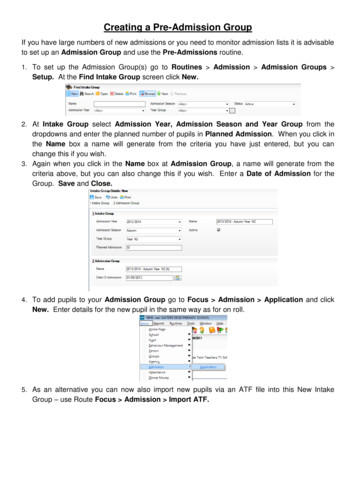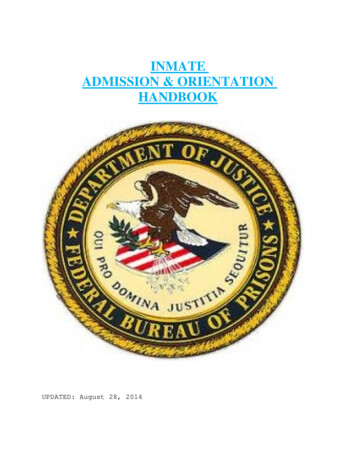
Transcription
INMATEADMISSION & ORIENTATIONHANDBOOKUPDATED: August 28, 2014
2The purpose of this handbook is to provide arriving inmates with informationregarding the Bureau of Prisons (BOP), its programs, and the rules andregulations. It is not a specific guide to the detailed policies of the BOP.Rather, the material in this handbook will help new inmates understand whatthey will be encountering when they enter prison, and assist them in theirinitial adjustment to incarceration.INTAKE, CLASSIFICATION AND THE UNIT TEAMOrientationInmates are given a social screening by Unit Management staff and medicalscreening by Health Services and Mental Health staff at the time of arrival.Inmates are immediately provided with a copy of the institution rules andregulations, which include information on inmate rights and responsibilities.It also includes information on sexual assault and abuse.Within 28 days of arrival, inmates will participate in the Admission andOrientation (A&O) Program. While in A&O, inmates are advised of theprograms, services, policies and procedures regarding the facility.Classification Teams (Unit Teams)Each inmate is assigned to a housing unit. A unit is a self-contained inmateliving area that includes both housing sections and office space for unitstaff. Each unit is staffed by a Unit Team directly responsible for theinmates living in the unit.The unit offices are located in the units sostaff and inmates can be accessible to each other. The unit staff includes aUnit Manager, Case Manager, Correctional Counselor, and Unit Secretary. TheStaff Psychologist, Education Advisor and Unit Officer are considered membersof the Unit Team and provide input for classification purposes.Inmates are assigned to a specific Unit Team. Generally, the resolution ofissues or matters of interest while at the institution are most appropriatelyinitiated with the Unit Team. Unit Team members are available to assist inmany areas, including parole matters, release planning, personal and familyproblems, counseling and assistance in setting and attaining goals while inprison. Ordinarily, a member of the unit staff will be at the institutionfrom 7:30 a.m. to 9:00 p.m., and during the day on weekends and holidays.GENERAL FUNCTIONS OF UNIT STAFFUnit Manager: The Unit Manager is the administrative head of the general unitand oversees all unit programs and activities. The Unit Manager is theChairperson of the team which comprises the Case Manager, CorrectionalCounselor, with input from Education and Psychology staff. The Unit Managerreviews team decisions and may chair the Unit Discipline Committee (UDC),which is a body that hears disciplinary infractions. The Unit Manager isordinarily present during initial classification and subsequent programreview(s) in which RRC placement is discussed.Case Manager: The Case Manager is responsible for all casework services andprepares classification material, progress reports, release plans,correspondence, and other materials relating to the inmate’s commitment. TheCase Manager serves as a liaison between the inmate, the administration, andthe community.
3Correctional Counselor: The Counselor provides counseling and guidance forthe inmates of the unit in areas of institutional adjustment, personaldifficulties, and plans for the future. They play a leading role in segmentsof unit programs relating to inmate activities. The Unit Counselor mayconduct counseling groups for inmates in his unit and/or groups open to thegeneral population.Unit Secretary: The Unit Secretary performs clerical and administrativeduties, to include the preparation of release paperwork.Unit Officer: The Unit Officers have direct responsibility for the dailysupervision of inmates and the enforcement of rules and regulations. Theyhave safety, security, and sanitation responsibilities in the unit. UnitOfficers are in regular contact with inmates in units and are encouraged toestablish professional relationships with them, as long as such interactiondoes not interfere with their primary duties. Unit Officers control movementin and out of the unit and conduct regular searches for contraband.CommunicationsNormally, a unit staff member is available each day of the week and mostevenings until 9:00 p.m. The unit bulletin boards and the TRULINCS systemcontain written communication of interest to inmates. Unit Managers mayutilize monthly Town Hall meetings to dispense information and fosterimproved communications. Unit team members will utilize either open househours or an open door policy to address inmate concerns. Inmates areencouraged to use Inmate Requests to Staff to make requests in writing viaTrulincs.Initial Classification/Program ReviewsInmates initially designated to the institution will receive initialclassification within 28 days of arrival. Unit, Education, and Psychologystaff will assess each inmate and work with them to develop an individualplan which will address skill deficits that may deter successful reentry intothe community.Subsequent program reviews will be held every 90 to 180 days, depending uponrelease date. These are held by the Unit Team to review progress onprogramming goals, work assignments, transfers, custody/security level,institutional adjustment, etc. The inmate may not waive appearance with theUnit Team.Reentry Pre-Release ProgrammingRelease preparation begins on the first day of incarceration. The BOP’sreentry strategy provides inmates with the opportunity to gain the necessaryskills and resources to succeed upon release. Through coordinated effortsamong the departments in the institution and collaboration with otheragencies, a wide array of programs and activities are offered to betterinmates’ chances of a successful reentry upon release.It is imperative at initial classification (Team) that inmates are open andhonest when answering questions to allow the team to accurately identifyneeds and make appropriate program recommendations to improve inmates’chances of a successful reentry. Each time an inmate goes to team, he willreceive a progress update and new recommendations as warranted.
4Contributors and programming recommendations include Education, HealthServices, Psychology, Unit Team, Recreation, Religious Services, the inmate’sWork Detail Supervisor, and the inmate. Inmates are strongly encouraged totake advantage of the program recommendations.Additionally, to make the transition back to the community go as smoothly aspossible, inmates should obtain at least two forms of identification toinclude a social security card. Inmates may also be eligible for somebenefits upon release (e.g., social security disability, veterans, Medicareetc.) to make the transition easier. Staff may be able to provide you withinformation concerning benefits so that you may determine your eligibilityand begin the application process if applicable prior to release. Lastly,the Career Resource Center, normally located in the Education Department, canalso provide you with pre and post release programming and education ideas,potential employment and housing information, as well as potential benefitsinformation.Town Hall MeetingsTown Hall meetings are held to make announcements and to discuss changes inthe policy and procedures of the unit. Inmates are encouraged to askpertinent questions of the staff and any guest speakers who are present.These questions should pertain to the unit as a whole, rather than personalquestions or problems. Personal issues will be resolved by unit staff duringthe regular working hours which are posted in each unit.Treaty Transfer for Non-U.S. InmatesInmates who are not U.S. citizens may be eligible for a transfer to theirhome country to serve the remainder of their sentence. At initialclassification, the inmate will be advised if the inmate’s home country has aformal exchange treaty with the United States. The Case Manager will provideadditional information regarding an inmate’s eligibility for participation inthe program.Foreign ConsularThe most recent publication of the Consular Notification and Access directorywill be located in the Law Library.DAILY INMATE LIFESanitationIt is the inmate’s responsibility to check his cell immediately after beingassigned there and report all damages to the Unit Officer or CorrectionalCounselor. An inmate may be held financially liable for any damage to hispersonal living area.Each inmate is responsible for making his bed in accordance with postedregulations before work call (including weekends and holidays when he leavesthe area). Each inmate is also responsible for sweeping and mopping his cellfloor, removing trash, and ensuring it is clean and sanitary. Cardboardboxes and other paper containers are not permitted for storage due to theircombustible nature. Lockers must be neatly arranged inside and out, and allshelving must be neat and clean. Chairs are assigned to each cell, and willnot be defaced or marked in any manner by the inmate.
5Toothpaste, toothbrushes, combs, razors, and soap for personal hygiene areissued by the institution laundry. Inmates may purchase name brand itemsthrough the Commissary.Personal Property LimitsItems which may be retained by an inmate are limited for sanitation andsecurity reasons, and to ensure excess personal property is not accumulatedwhich would constitute a fire hazard or impair staff searches of the cell.Storage SpaceStaff shall set aside space within each housing area for use by an inmate.The designated area shall include a locker or other securable area in whichthe inmate is to store authorized personal property. The inmate shall beallowed to purchase an approved locking device for personal property storagein regular living units. Limited space may also be available under the bedfor approved items. The amount of personal property allowed each inmate islimited to those items which can be neatly and safely placed in the spacedesignated. Under no circumstance will any materials be accumulated to thepoint where they become a fire, sanitation, security, or housekeeping hazard.ClothingCivilian clothing (i.e. clothing not issued to the inmate by the Bureau orpurchased by the inmate through the Commissary) ordinarily is not authorizedfor retention by the inmate. Prerelease civilian clothing for an inmate maybe retained by staff in the Receiving and Discharge area during the last 30days of an inmate’s confinement. All inmates are prohibited from wearing anyclothing not government-issued or purchased in the Commissary. No inmatesmay be issued, permitted to purchase, or have in their possession any blue,black, red, or camouflage clothing or cloth items. Commissary sales ofclothing are limited to the following colors: Only gray and/or white clothingmay be sold in institutions for males. The only exception is for religiousheadgear.Government items are to be neatly stored in the identifiedstorage space provided. Individual washcloths and towels are issued toinmates. Representative authorized footwear/shoes may include: work (1 pr.),shower (1 pr.), athletic/specialty (1 pr. – black, white, grey, or acombination thereof with a maximum value of 100.00), slippers (1 pr.), andcasual (1 pr.). Footwear will be placed neatly under the bed.Commissary/Special Purchase ItemsThese items are authorized to the point they can be contained in the storagearea provided for personal property.Letters, Books, Photographs, Newspapers, and MagazinesAn inmate will be limited in the number of letters, books, photographs,magazines, and newspapers that can be stored in their designated storagespace. Nothing is to be tacked, stapled or scotch taped to any surfaceexcept. Ordinarily, photographs, particularly those of family and friends,are approved, since they represent meaningful ties to the community.Personal photographs may be stored or displayed in the housing unitsaccording to local sanitation and housekeeping guidelines. Inmates may notretain Polaroid photos. Nude or sexually suggestive photos (individualprints or copies as opposed to those from publications) present specialconcerns about personal safety, security, and good order, particularly whenthe subject is an inmate’s relative, friend, or acquaintance or could -
6reasonably be perceived as such. For these reasons, an inmate may not bepermitted to retain, receive, or possess a personal photograph in which thesubject is partially nude or nude, or when the photograph depicts sexual actssuch as intercourse, fellatio, or sodomy. These materials will be returnedto the sender upon receipt at the institution.Legal MaterialsStaff may allow an inmate to possess legal materials in accordance with theprovisions on inmate legal activities.Hobbycraft MaterialsStaff shall limit an inmate’s hobbycraft projects within the cell or livingarea to those projects which the inmate may store in his designated walllocker. Staff shall require that hobbycraft items be removed from the livingarea when completed.Radios, MP3 Players, and WatchesAn inmate may possess only one bureau approved radio and/or MP3 player, andwatch at any time. The inmate must be able to demonstrate proof ofownership. An inmate who purchases a radio, MP3 player, or watch through aBOP commissary is ordinarily permitted the use of that item at any BOPinstitution if the inmate is later transferred. The MP3 player can bemanaged through TRU-Units. This service allows inmates to manage the playerand to purchase non-explicit music.JewelryInmates may have a plain wedding band and an appropriate religious medallionand chain without stones.Quarters RulesIn order to minimize maintenance costs, permit uniform inspection, searchprocedures, and maintain orderly congregate living, the institution hasimposed reasonable regulations on inmate conduct and furnishings in housingunits. Unit Officers and Counselors inspect cells daily and publishindividual ratings of appearance.All beds are to be made daily in the prescribed manner.not acceptable, disciplinary action will be taken.If a cell or room isUnit meal rotation is ordinarily based on weekly sanitation ratings of eachunit. The unit with the highest sanitation is called first, and the unitwith the lowest rating is called last.Room or cell doors are closed when inmates are not in them.Each inmate is responsible for the cleaning and sanitation of his cell.Everyone is responsible for cleaning up after themselves.Showers are available every day, but inmates may not be in the shower duringan official count.Safety shoes must be worn to work as designated in policy.
7Wake-upA general wake-up for all inmates is 6:00 a.m. It is the inmate’sresponsibility to leave the unit for meals and work.Clothing Exchange & LaundryInstitutions issue clothing to the inmate population that is properly fitted,climatically suitable, and presentable. Institutions will furnish eachinmate with sufficient clothing to allow at least three changes of clothesweekly.Institutions establish local procedures to account for the initial issue ofGovernment furnished items to inmates and for their return before release.Government issued clothing will not be altered or disfigured in any manner.The institution provides clean clothing by utilizing a centralized laundry.CommissaryThe BOP maintains inmate monies (Deposit Fund) while incarcerated. Thepurpose of the Deposit Fund is to provide inmates the privilege of obtainingmerchandise and services either not provided by the BOP or a differentquality than that provided by the BOP. An inmate may use funds in theiraccount to purchase items at the institution commissary, place funds on theirinmate phone account, purchase TRU-Units for their TRULINCS account, or sendfunds by creating a BP-199. Inmates may not be in possession of cash at anytime. Upon release, all Trust Fund accounts will be consolidated and placedon an Inmate Release Debit Card.Commissary and validation schedules are posted on the inmate bulletin boards.Funds are withdrawn after positive identification by commissary card orfingerprint identification. Inmates may verify their account balances byutilizing the TRULINCS or the inmate telephone (118 PAC). Inmates must havetheir commissary card on a lanyard at all times for identification purposes.Spending LimitationsThe National Spending Limit is 320.00 but may be further restricted at thelocal level. Each inmate account is revalidated on a monthly, bi-weekly, orweekly cycle.Deposits to AccountsU.S. Postal ServiceInmates' families and friends choosing to send inmates funds through the mailmust send those funds to the following address and in accordance with thedirections provided below:Federal Bureau of PrisonsInsert Valid Committed Inmate NameInsert Inmate Eight-Digit Register NumberPost Office Box 474701Des Moines, Iowa 50947-0001The deposit must be in the form of a money order made out to the inmate'sfull committed name and complete eight-digit register number. EffectiveDecember 1, 2007, all non-postal money orders and non-government checksprocessed through the National Lockbox will be placed on a 15-day hold.
8The BOP will return to the sender funds that do not have valid inmateinformation provided the envelope has an adequate return address. Personalchecks and cash cannot be accepted for deposit.The sender's name and return address must appear on the upper left-handcorner of the envelope to ensure the funds can be returned to the sender inthe event that they cannot be posted to the inmate's account. The depositenvelope must not contain any items intended for delivery to the inmate. TheBOP shall dispose of all items included with the funds.In the event funds have been mailed but have not been received in theinmate's account and adequate time has passed for mail service to Des Moines,Iowa, the sender must initiate a tracer with the entity who sold them themoney order to resolve any issues.Western Union Quick Collect ProgramInmates' families and friends may also send inmates funds through WesternUnion's Quick Collect Program. All funds sent via Western Union's QuickCollect will be posted to the inmate's account within two to four hours, whenthose funds are sent between 7:00 a.m. and 9:00 p.m. EST (seven days perweek, including holidays). Funds received after 9:00 p.m. EST will be postedby 7:00 a.m. EST the following morning. Funds sent to an inmate through theQuick Collect Program may be sent via one of the following ways:1) At an agent location with cash: The inmate's family or friends mustcomplete a Quick Collect Form. To find the nearest agent, they may call1-800-325-6000 or go to www.westernunion.com.2) By phone using a credit/debit card: The inmate's family or friends maysimply call 1-800-634-3422 and press option 2.3) ONLINE using a credit/debit card: The inmate's family and friends may goto www.westernunion.com and select "Quick Collect."For each Western Union Quick Collect transaction, the following informationmust be provided:1) Valid Inmate Eight-Digit Register Number (entered with no spaces ordashes) followed immediately by Inmate's Last Name.2) Committed Inmate Full Name entered on Attention Line.3) Code City: FBOP, DC.Please note the inmate's committed name and eight-digit register number mustbe entered correctly. If the sender does not provide the correctinformation, the transaction cannot be completed. The Code City is alwaysFBOP, DC.Each transaction is accepted or rejected at the point of sale. The senderhas the sole responsibility of sending the funds to the correct inmate. Ifan incorrect register number and/or name are used and accepted and posted tothat inmate, funds may not be returned.
9Any questions or concerns regarding Western Union transfers should bedirected to Western Union by the sender (general public). Questions orconcerns should not be directed to the BOP.MoneyGram ExpressPayment ProgramInmates' families and friends may also send inmates funds through MoneyGram’sExpressPayment Program. All funds sent via MoneyGram’s ExpressPayment willbe posted to the inmate's account within two to four hours, when those fundsare sent between 7:00 a.m. and 9:00 p.m. EST (seven days per week, includingholidays. Funds received after 9:00 p.m. EST will be posted by 7:00 a.m. ESTthe following morning. Funds sent to an inmate through the MoneyGramExpressPayment Program may be sent via one of the following ways:1) At an agent location with cash: The inmate's family or friends mustcomplete a MoneyGram ExpressPayment Blue Form. To find the nearest agent,they may call 1-800-926-9400 or go to www.moneygram.com.For each MoneyGram ExpressPayment transaction, the following information mustbe provided:1) Valid Inmate Eight-Digit Register Number (entered with no spaces ordashes), followed immediately by Inmate's Last Name.2) Company Name: Federal Bureau of Prisons.3) City & State: Washington, DC.4) Receive Code: Must always be 7932.5) Committed Inmate Full Name entered on Beneficiary Line.Please note that the inmate's committed name and eight-digit register numbermust be entered correctly. If the sender does not provide the correctinformation, the transaction cannot be completed.Each transaction is accepted or rejected at the point of sale. The senderhas the sole responsibility of sending the funds to the correct inmate. Ifan incorrect register number and/or name are used and accepted and posted tothat inmate, funds may not be returned.2) ONLINE using a credit, debit or prepaid card (Visa or MasterCard only):The inmate's family and friends can click on www.moneygram.com/paybills.Enter the Receive Code (7932) and the amount you are sending (up to 300).If you are a first time user you also must set up a profile and account.Any questions or concerns regarding MoneyGram ExpressPayment transfers shouldbe directed to MoneyGram by the sender (general public). Questions orconcerns should not be directed to the BOP.
10Commissary Fund WithdrawalsRequests for Withdrawal of Inmate Personal Funds, BP-199 forms, will beprocessed weekly by Trust Fund, Inmate Accounts. Withdrawals are initiatedin TRULINCS, Send Funds (BP-199) by the inmate. When the BP-199 is printedit must be signed by the inmate in staff presence and hand delivered. TheSupervisor of Education approves withdrawal requests for correspondencecourses and materials for approved education programs. Unit Managers willapprove all other withdrawal requests. Only an Associate Warden can approveinmate withdrawals exceeding 500.00.TRULINCSThe Trust Fund Limited Inmate Computer System (TRULINCS) is the inmatecomputer network that provides inmates access to multiple services. At notime do the inmates have any access to the Internet.Inmate’s access dedicated TRULINCS workstations installed in various housingunits and common areas to perform various functions using their registernumber, Phone Access Code (PAC), and Commissary Personal IdentificationNumber (PIN). Inmate access to these workstations varies depending on theinstitution.Account Transactions – This service allows inmates to search and view theirCommissary, telephone, and TRULINCS account transactions, as well as, viewtheir Media List.Bulletin Board – This service is used to supplement the use of inmatebulletin boards within the institution for disseminating information to theinmate population.Contact List - This service is used by inmates to manage their email addresslist, telephone list, and postal mailing list. Inmates also mark for printpostal mailing labels within this service.If an email address is entered for a contact, TRULINCS sends a systemgenerated message to the contact directing them to www.corrlinks.com toaccept or reject email contact with the inmate prior to receiving anymessages from the inmate. If a positive response is received, the inmate maybegin exchanging electronic messages with this contact. If a contact rejectsTRULINCS participation, the inmate is blocked from sending any messages tothat email address.Law Library – This service allows inmates to perform legal research.Manage Funds – This service allows inmates to manage their personal funds bycreating/canceling Requests for Withdrawal of Inmate Personal Funds (BP-199)and their Pre-Release Account.Manage TRU-Units – This service allows inmates to purchase TRU-Units usingavailable Commissary funds or transfer TRU-Units back to their Commissaryaccount.
11Prescription Refill – This service allows inmates to request prescriptionrefills via TRULINCS of self-carry medications that are ready for refilldirectly to the Pharmacy. Pharmacy staff will receive the prescriptionrefill request and process the request accordingly. Inmates will followestablished local procedures for picking up requested prescriptions.Print – This service allows inmates the opportunity to print variousdocuments marked for print within TRULINCS. Mailing labels and BP-199 formsmay be printed for free. All other documents can be printed at a cost.Public Messaging – Inmates may correspond with friends and family usingpublic messaging. This is a restricted version of email that will only allowtext messages and no attachments. There is a cost per minute fee for usingthis service. Messages are limited to 13,000 characters.Request to Staff – This service allows inmates to correspond with staffelectronically. The list of available departments varies by institution;however, there is a standard DOJ Sexual Abuse Reporting mailbox availablethat provides inmates with an additional method to report allegations ofsexual abuse and harassment directly to the Office of Inspector General(OIG).Survey – This service allows inmates to take Bureau surveys (i.e.,Institution Character Profile).Inmate Telephone System –TRUFONEEach inmate will be provided a nine-digit Phone Access Code (PAC) foraccessing TRUFONE; including instructions for use of this system. The PAC isconfidential and should not be shared with other inmates. A replacement feewill be charged if a PAC is misplaced or compromised. In addition, eachinmate will need to perform voice verification registration. Management ofinmates’ telephone numbers is performed via the TRULINCS.The hours of telephone operation begin at 6:00 a.m. and end no later than11:30 p.m. Inmate access to telephones will normally be limited during thefollowing times, Monday through Friday, not including holidays: 7:30 a.m.until 10:30 a.m.; and, 12:30 p.m. until after 4:00 p.m. count.Inmates are expected to be at their work assignments and must not use thetelephone during their work hours. For inmates who work varied work shifts,at local discretion, institutions may leave one telephone per unit availablefor inmates on “days off,” or “evening shift.”Directions for use of TRUFONE are posted near the telephones. All calls arelimited to 15 minutes. Telephone calls are subject to monitoring andrecording by institution staff. Inmates are limited to 300 minutes per monthand may be used for any combination of collect or direct dial calls.Ordinarily, inmates will be allowed an extra 100 minutes per month inNovember and December. Telephone rates are posted throughout theinstitution.
12TRUFONE credits are transferred using the TRUFONE system and must be done ineven dollar amounts. The TRUFONE credits are deducted from an inmate’scommissary account and transferred to the TRUFONE account immediately.Transfers may be made from any telephone during operational hours. It iseach inmate’s responsibility to verify the correctness of the amounttransferred at the time of transfer.SECURITY PROCEDURESAttireInmates will be in the proper uniform, (khaki pants and khaki shirt), andinstitution issued footwear, Monday thru Friday, between 7:30 a.m. and3:30 p.m. The uniform will be maintained in a neat and professional manner,with shirt tucked in and pants around the waist line. Other than approvedreligious headgear, hats will not be worn while indoors except in designatedwork areas.Inmate Identification CardsInmates are required to wear their identification cards at all times upondeparting their assigned unit. The inmate identification card will beaffixed to a lanyard worn around the neck. Inmates will be issued anidentification card upon arrival at the institution. Inmates are responsiblefor the care of these cards. Lost, stolen, or damaged cards must bereplaced.CountsFCI Gilmer will conduct, at a minimum, five official inmate counts duringevery 24-hour period. On weekends and holidays, an additional count will beconducted at 10:00 a.m. The inmate is expected to be standing at bedsideduring official counts held at 4:00 p.m. and 10:00 p.m. on weekdays and10:00 a.m., 4:00 p.m., and 10:00 p.m. on weekends and holidays, and duringany emergency count. The inmate must actually be seen at all counts, even ifthe inmate must be awakened.Call-OutsCall-outs are a scheduling system for appointments (which include medical,dental, educational, team meetings, and other activities) and are posted eachday on the unit bulletin boards and TRU-LINKS after 4:00 p.m., on the daypreceding the appointment. It is the inmate’s responsibility to check forappointments on a daily basis.Controlled MovementDuring non-working hours, movement throughout the institution will beregulated by a procedure called controlled movement. Controlled movementsare a one way move, meaning, "in-bound" or "out-bound" move. During themovement period, inmates may move from an area of the institution to another.The start and end of each movement period will be announced by staff.During the evening hours, the first controlled movement period normallybegins at the conclusion of the 4:00 p.m. count.
13On weekends and holidays, normally the first controlled movement will beginat the conclusion of the morning meal. The Compound will be secured at9:30 a.m., in preparation of the 10:00 a.m. count.ContrabandItems possessed by an inmate ordinarily are not considered to be contrabandif the inmate was authorized to retain the item upon admission to theinstitution, the item was issued by authorized staff, purchas
classification, the inmate will be advised if the inmate's home country has a formal exchange treaty with the United States. The Case Manager will provide additional information regarding an inmate's eligibility for participation in the program. Foreign Consular The most recent publication of the Consular Notification and Access directory

